Welcome back to the Faculty Features series! Every Friday during this eight-week series we’ll be sharing a short interview with some of our faculty members; highlighting their teaching, upcoming courses, and getting to know them better! Today we’re featuring Professors Laura Alexander, Rahsaan Barber, Marc Callahan, Annegret Fauser, Samuel Gold, and Lee Weisert.
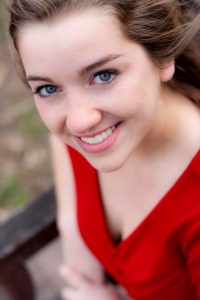
Lecturer Laura Alexander
What is your position on faculty and what courses are you teaching next semester (and this summer, if applicable)? I’m the conductor of the Glee Club for Soprano/Alto Voices, which is a choir open to singers of all experience levels.
What is your favorite part of teaching? I love experiencing the growth as an ensemble that each new semester brings. Although the singers all grow as individuals, and that’s wonderful to observe over the years, the more exciting development happens as they respond to the voices around them, crafting a completely unique sound with each new combination of voices.
What is the project that you’re most excited about currently? We’re taking a hybrid approach this semester, so I’m really excited to see how this process will blossom into our final concert. We started in a remote format, which can be extremely challenging in terms of developing a group sound. In mid-March, some of the students began outdoor rehearsals, while others remained remote, so I’ve enjoyed hearing how the in-person experience has changed how the singers express the music and interact with one another as musicians. I think that shift has had ripple effects even for those students needing to stay remote as they’ve heard the change in their classmates’ interpretations. Some of our pieces will be performed live, while others will be edited together to create a virtual choir using individual recordings from each singer.
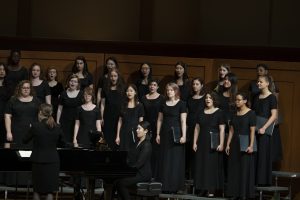
What are some of your non-musical hobbies? I run every morning with my two rescue pups, Cassie and Lonnie, and I recently rekindled my love of yoga. I travel anytime I have the chance, but during the pandemic, I’ve had to settle for jigsaw puzzles of beautiful destinations.
If your students could learn one thing from you, what do you hope it will be? I hope that all of my students will carry a love of singing with them as they move into the next stages of their lives, even if they don’t continue singing in a choir. Singing is a lifelong activity that engages the breath, body, and mind in unique and beautiful ways.
What music are you currently listening to? Hildegard von Bingen, Giovanni Pierluigi da Palestrina, Rhiannon Giddens, and the Wailin’ Jennys.
Anything else you’d like students to know about you or your teaching? We are incredibly fortunate to have the incomparable Dr. Shoko Abe as our collaborative pianist. Having such a talented and kind pianist makes each rehearsal wonderful.
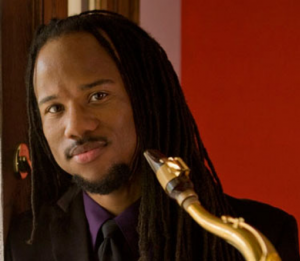
Assistant Professor Rahsaan Barber
What is your position on faculty and what courses are you teaching next semester (and this summer, if applicable)? I’m an Assistant Professor of Saxophone and Jazz Studies, and I will be teaching Jazz Saxophone and Jazz Band, a student big-band, next Fall.
What is your favorite part of teaching? There is a spiritual aspect to the effect of music, and I’m so thankful to be involved in an art form which celebrates creativity, self-expression, and individuality.
What is the project that you’re most excited about currently? In December, I recorded my first new collection of original jazz compositions in 10 years for a double-disc album entitled MOSAIC, which was released earlier this month. It features my Nashville-based quartet with pianist Matt Endahl, bassist Jack Aylor and drummer Derrek Phillips, as well as special guests trumpeter Nathan Warner and my twin brother, trombonist Roland Barber. These musicians are my closest collaborators and I believe we’ve created a truly unique and impressive recording.
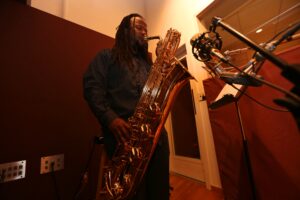
What are some of your non-musical hobbies? Well, to answer most literally, I’d have to speak of my love for playing tennis! While I love basketball, too, tennis seems to offer a uniquely individual experience and set of challenges which I always look forward to facing and growing from as a player. That said, my other great passion is for Latin dancing, which is certainly more musical than non-musical, but doesn’t involve musical performance, most of the time! A perfect Friday or Saturday night for me would definitely include a stop at the local salsa club!
If your students could learn one thing from you, what do you hope it will be? I would hope my students develop a willingness to do the work that the accomplishment of their passions and ambitions will require of them, whether those be music-related or not.
What music are you currently listening to? I’m listening to the work of my fellow faculty here at UNC – specifically, Dr. Stephen Anderson’s trio recording, Believe, and his Duo recording with our jazz bass instructor, Jason Foureman. I’m also continuing to deepen my knowledge of great classical saxophone recordings.
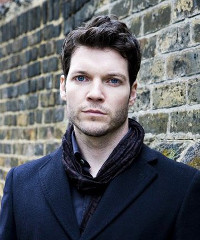
Assistant Professor Marc Callahan
What is your position on faculty and what courses are you teaching next semester (and this summer, if applicable)? As an Assistant Professor of Music at UNC-CH, I teach private voice lessons and am the director of UNC Opera. With my ensemble, we are currently working on Meredith Monk’s opera ATLAS and next year will see performances of Will Todd’s Alice’s Adventures in Wonderland as well as a work from the standard repertoire TBD! Watch this space!
What is your favorite part of teaching? For me, teaching is like having my own artist’s studio. My favorite part is having the space (the rehearsal room) and the materials (eager students) to create works of performance art. Teaching gives me the opportunity to walk into a studio with big ideas and, over the course of a semester, mold those ideas into a collaborative work of art. Creating new and reimagined operas with my students and watching them become empowered performers and storytellers is incredibly rewarding.
What is the project that you’re most excited about currently? As a performer, director, and songwriter, I have so many! As a singer, I’ve been most excited to reunite with my friends, artist Andrew Myers and pianist Keiko Sekino, on an interdisciplinary performance of Schubert’s epic song cycle Winterreise. Keiko and I are also contracted by Albany Records to record this cycle, which we plan to do once some of the pandemic restrictions are lifted. As a director, I am finding immense joy in being back in the rehearsal room with my students on Monk’s ATLAS, creating improvised “vocal rooms” and working as a dramaturge to tell a story about migration. And, as a songwriter, I’ve been discovering a new side to my creativity in writing songs for the musical play A GOOD BOY by Lynden Harris, telling stories of those affected by our prison systems in America.
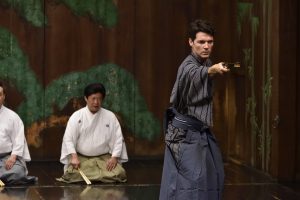
What are some of your non-musical hobbies? I really enjoy building historical costumes–a hobby that I picked up over the pandemic–as well as studying the Japanese language and aesthetics of traditional Japanese theater and dance.
If your students could learn one thing from you, what do you hope it will be? To be fearless. To know the rules of the game and then break them! You must know how to construct a box but also how to think outside of it. My students will encounter so many people throughout their careers that will try to define their artistry in terms that are easily categorized. Humans do that–we like to label things so that they are easily understood. I hope to give them the foundational skills that they need to succeed in the profession while encouraging them to engage with all parts of their creative selves, taking their artistry to a level that can only be defined as original.
What music are you currently listening to? ”Uiyo” and “No Rain, No Rainbow” are a couple of feel-good songs that I use to combat the pandemic. So, if you see me driving; I’m probably listening to those! I also dance around to a lot of Meredith Monk in my kitchen, these days. In part because I am staging one of her operas but it’s also just a great way to feel physically expressive and free at a time when I feel a bit boxed-in on Zoom.
Anything else you’d like students to know about you or your teaching? In the voice studio, I am a bit of a perfectionist and I nitpick a lot–just ask any of my students! I try to counteract this by connecting vocal technique with dramatic and physical flexibility. In the opera studio, I aim to create a fun working space for theatrical experimentation, combining traditional methods with new explorations in producing opera for the 21st century!
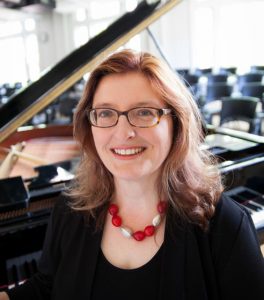
Professor Annegret Fauser
What is your position on faculty and what courses are you teaching next semester (and this summer, if applicable)? The official title of my position is the Cary C. Boshamer Distinguished Professor of Music. I am also an Adjunct Professor in Women’s and Gender Studies. In reality, that means that I get to teach a lot of fun and cross-over things. One advantage of having been teaching many different topics is that I get to discover new musics and that I can share them with my students. This will be happening next semester because I will be teaching a newly developed course for non-majors, “Introduction to Music and Dance.” In this course, I plan to approach music and dance as intertwined forms of human expression, whether it is ballet, ballroom, or b-dance. I am looking forward to this as a shared discovery with the students.
What is your favorite part of teaching? My favorite part of teaching is when students start contributing to discussions, especially when they are about difficult subjects, and share their ideas. For example, last semester, in “Introduction to Women and Music,” we had intense discussions about music, racism, and sexuality after watching such videos as WAP (Meghan Thee Stallion and Cardi B), Black Like Me (Mickey Guyton), or Turntables (Janelle Monáe). I love mixing up Western classical and current popular musics.
What is the project that you’re most excited about currently? It’s a project that has already been completed: Performing Commemoration, a book that I co-edited with my colleague Michael A. Figueroa. It is about how music and reenactment come together when people commemorate traumatic events. We have just had an intense conversation about the book in an online format. I also just finished a really interesting small project about which music has been associated with the Statue of Liberty. One song from a musical that has a lot of contemporary echoes (even though it is from 1949) is Irving Berlin’s setting of “Give Me Your Tired, Your Poor.”
What are some of your non-musical hobbies? Besides traveling (which I love very much), I have developed a hobby into something more, in that I would say I have a second expressive field as an Art Quilter. I recently finished a British certification from the City & Guilds, and the School where I took the course has published a small profile about me. You might recognize Hill Hall 103 as the room in which the portrait was taken.
If your students could learn one thing from you, what do you hope it will be? Joy in really listening to music. It is easy to have music as a background to things we do, from workouts, to driving, to dancing. But there is an alchemy that happens when one listens very carefully and traces the elements—the rhythmic beat, for example, or phrases that come back. If one tunes one’s ears really into the sound, there is such beauty. I find this when listening closely to Janelle Monáe’s PYNK, to Jessye Norman performing “Amazing Grace,” or listening to Arnold Schoenberg’s Verklärte Nacht. Each has its very own magic.
What music are you currently listening to? Yesterday was a classic-music day. I was listening to Anton von Webern’s Concerto for Nine Instruments (op. 24), with its hauntingly beautiful second movement, the first movement of Gustav Mahler’s Symphony no. 2 (Resurrection), and Florence B. Price’s song, on a poem by Langston Hughes, “Hold Fast to Dreams.” Sometimes I listen to music because it’s part of my job: for example when I need to find the right musical extracts for a class; but sometimes it is just for the sheer joy either returning to a familiar piece (and yes, Mozart’s concert aria, “Ch’io me scordi di te?”, K. 505, is still my favorite piece of music in the world.)
Anything else you’d like students to know about you or your teaching? I can’t stand it when students (or, worse, lawnmowers) make noise when we listen to music. It seems sometimes that students have gotten so used to listening when the professor speaks that the musical part becomes a form of switching off—checking texts, going to the bathroom, typic emails—when the whole point of a class about music is the listening, at least for me.
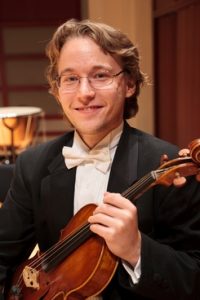
Lecturer Samuel Gold
What is your position on faculty and what courses are you teaching next semester (and this summer, if applicable)? I’m a viola teacher, and I also work full time with the North Carolina Symphony, so currently, private lesson instruction is my only course.
What is your favorite part of teaching? This is probably the obvious answer, but I’ve had a few “light bulb” moments with students and they really make my day. Lots of problems don’t have easy answers, and it’s definitely satisfying to watch a student grow in overall maturity and facility over time. But once in a while, there is a moment when a specific shift in perspective or a slight physical adjustment suddenly allows a student to recreate a sound they hear in their mind with less effort and less stress. And it feels a bit like magic.
What is the project that you’re most excited about currently? Obviously, I haven’t been able to perform as much lately, so I’m very slowly beginning to attempt to teach myself composition (I hope that was enough qualifiers). I’m nowhere near putting anything out into the world, but it’s definitely been exciting!
What are some of your non-musical hobbies? Nerd stuff, basically. I am an unabashed TV binger and PC gamer, both of which have served me very well in the covid era. I also love racquetball but that hasn’t been as feasible. Lately, I’ve also been enjoying walks and jigsaw puzzles with my partner, and reading composer biographies, especially the work of Jan Swafford.
If your students could learn one thing from you, what do you hope it will be? I see my work with any student as being one continuous process of helping them find and strengthen their natural connection with music. The specific music we’re working on, like the instrument itself, is just a medium between the student and music as a universal human experience. I always see my goal as removing technical and mental barriers between the student and the pure enjoyment of making music. So I guess the thing I want them to learn is that they can get even more fun and satisfaction out of music than they thought they could.
What music are you currently listening to? I’m a Bartok stan, and I never go for too long without listening to one of his quartets. Emerson, Takacs, Tokyo, Borromeo, and Endellion quartets are some of my favorite recordings. I also revisit his Piano Concertos, the Concerto for Orchestra, and the Divertimento quite frequently.
Quatuor Ebene’s Beethoven cycle from last year. Not only does it have the pristine intonation and sound quality of most modern recordings, I love their tempos and variety of vibrato, including a totally straight tone that reminds me of the King’s Singers.
Like most Midwestern Jewish boys I also love hip-hop, and right now I’m playing a lot of Young Thug, Run the Jewels, and Cory Gunz (who is tragically under-rated in case anyone is looking for new music in that vein)
Anything else you’d like students to know about you or your teaching? Two things that may be good to know. First: I am not a teacher who can tell you in advance exactly what I’m going to say for the whole semester. I find students too different from each other to be comfortable teaching from a specific method. 1 on 1 lessons are quite different from a traditional class, and I require a lot of input from the student about what is and isn’t working so I can adapt to their individual needs and style.
Second: you can get as much out of lessons as you want to put into them. I believe that music is accessible to anyone and should ultimately be for fun, but I’ve also been through conservatory and professional auditions and I know what they require. So lessons can be a relaxing addition to a busy academic schedule or the main focus of your semester. The only requirement I have is that you want to be there.
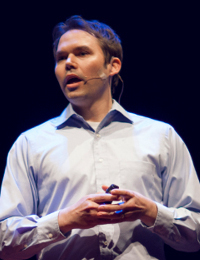
Professor Lee Weisert
What is your position on faculty and what courses are you teaching next semester (and this summer, if applicable)? I am an associate professor and I teach primarily music technology, composition, and musicianship. Next semester I’ll be teaching Musicianship Skills II (MUSC 133) and Introduction to Music Technology (MUSC 239).
What is your favorite part of teaching? When students get excited about a creative project or assignment and you give them plenty of time to share what they’ve done, it can be really inspiring. I love how kind and supportive students are to each other and how they amaze each other. When I can disappear from the learning process and let them take over, that is really fun.
What is the project that you’re most excited about currently? Before COVID hit I was working on a big sound installation project with a long-time artistic collaborator of mine. But that got put on hold since we can’t travel anywhere or put on a performance safely. I’m really looking forward to getting back to that—it involves lots and lots of radio-controlled robotic instruments.
What are some of your non-musical hobbies? Does playing guitar count? I have a 4-year-old and a 7-year-old and neither of them are in school at the moment, so no hobbies.
If your students could learn one thing from you, what do you hope it will be? To listen to as much great music as possible, and to be interested in everything because pretty much everything is interesting.
What music are you currently listening to? I’m teaching a film music class at the moment so I’ve been listening to a lot of film scores. Currently, I am enjoying the “Spirited Away” soundtrack by Joe Hisaishi and the “Parasite” soundtrack by Jung Jae-Il. I recently discovered Baaba Maal’s record “The Traveller,” which is very beautiful.
Anything else you’d like students to know about you or your teaching? I am an actual human, and not just a collection of animated digital pixels on a screen.
